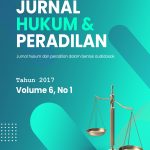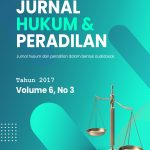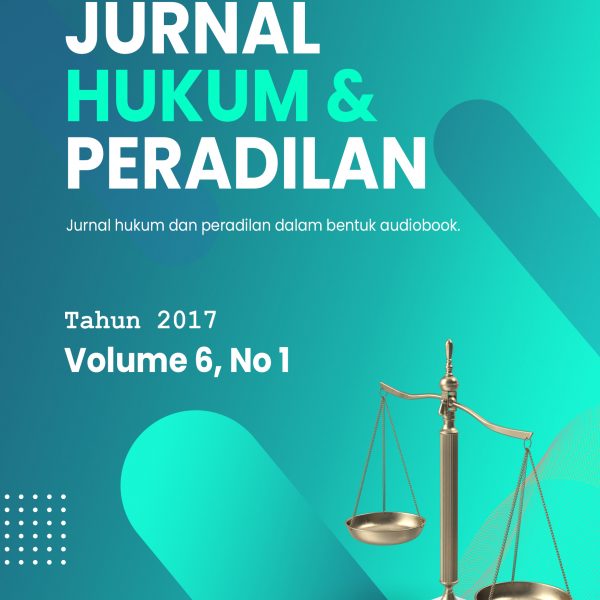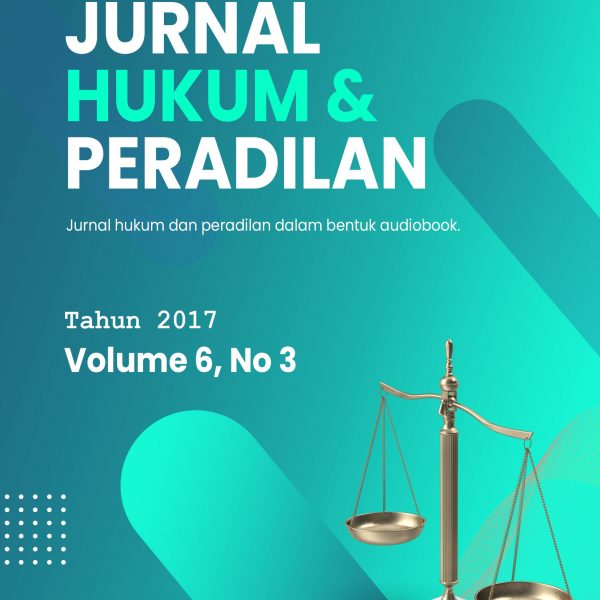
Jurnal Tahun 2017
Volume 6, No 2
Abstrak.
The setting of environmental law in Indonesia has started to improve since the Law Number 32 of 2009 on Environmental Protection and Management contains criminal act for every person who violates the provisions. It is stated in Article 98, 99, 100. This research method is a library or literature research which is conducted to gather secondary data in the field of environmental law and fiqh al-bi’ah. This research is normative law research while the nature of this research is descriptive analysis. It aimed to give a systematic illustration on legal norms that was found in law number 32 of 2009 and environmental fiqh accurately and the criminal sanctions review used in both arrangements. In this study there were two questions first, how is the arrangement of criminal act in Law No. 32 of 2009 on Environmental Protection Management. The second is whether the concept of fiqh al bi’ah is in line with Law No. 32 of 2009 on Environmental Protection Management. The result from this study is that the criminal act contained in the Law No. 32 of 2009 on Environmental Protection Management has not been enough to trap the environmental destroyer so that the government is expected to revise the unsuitable articles. Furthermore, the result of this research shows the similarity concept between fiqh al bi’ah and environmental governance in Indonesia. The concept offered by fiqh al bi’ah is a part of maqashidul syari’ah where Islam strongly recommended to maintain the environment.
Abstrak.
Through the ecletic-incorporation method and prismatic concept, the concept of diyat which has been modified will make it able to experience the unification of the law for the nation of Indonesia. Through the goodness and excellence of the concept of diyat, the author believes it is an alternative solution to the failure of the Criminal Justice System that is currently used. The main objective of the Paradigm of the Pancasila Law is not just to achieve justice, but also to achieve peace in the life of society, nation and state. Reversing the conditions of the community to its original state (restitutio in integrum) is the main goal in the Paradigm of the Pancasila Law. However, the infiltration process of the concept of diyat, must be realized through in-depth study, in particular against any criminal acts that can be applied. The concept of diyat in its essence also brings about a shrinkage of the powers of the judge in imposing imprisonment against perpetrators of certain crimes that are established by the Political Criminal Law and Criminal Law System in Indonesia, once peace and justice is achieved by the victims and / or their families. The writing of this paper uses normative juridical method with approach to legislation, conceptual approach, philosophical approach and sociological approach.
Abstrak.
Indonesia’s has control over vast seas potential to support the country’s economy. However, the potential was not optimal because of fishery crime and the lacking of law enforcement in the field of fisheries. This matter becomes very important and strategic in order to support the fishery development in a controlled manner and in accordance with the principles of sustainable fishery management. However, in practice, law enforcement in fisheries shows weaknesses. It is evident from the very complex problems of criminal offenses fisheries, interagency coordination mechanism problems and the establishment of a fishery court to enforce the law that is not evenly distributed throughout the territory of the district court. In resolving these problems, reforms in law enforcement is the key factor that is focused on the legal and human resources. With this support of fishery law enforcement, it is hoped that fisheries development can be carried out in a sustainable manner.
Abstrak.
PPHI (Industrial Relations Disputes Settlement) Act regulates the principle of settlement of industrial relations disputes by consensus, if there is a dispute between employee/workers and employers, the first stage of dispute settlement shall be submitted to disputing party (bipartite settlement). The provisions of Article 63 paragraph (2) and Article 67 paragraph (1) sub-paragraph f of the Act shall result in the ad-hoc judges of the Industrial Relations Court, in carrying out their duties and responsibilities to examine and decide a case shall be independent and kept away from any intervention of any institution. The ad-hoc judges of the Industrial Relations Court is a judge proposed by a trade union, employers organization, also dismissed respectfully by the trade union and the employers organization. This will undermine the free, impartial and clean judicial system that dreams of because the judges will be ruled by the litigants, as the judge is appointed and dismissed by the party to be tried in the industrial relations court.
Abstrak.
Indonesia is the fourth largest country in the capacity of the population number in the world. As the country with the largest population, various problems often plague the nation of Indonesia. One such problem is the problem of law enforcement and narcotics and drugs cases. Up to now Indonesia is confronted with drug trafficking that is very alarming. Drug crimes are so uncontrolled in social life. It is undeniable that narcotics have been threatening the future of the nation. There have been already many victims even until some of them dies. Drug abuse has reached very dangerous phase. There is no other way, government and officials must immediately take a serious and earnest step. It is a pity that the nation’s children must always be the victims of drug distribution by the syndicate. Laws must be enforced as fairly as possible. Because the law is the supreme commander that must not be defeated by anything.
Abstrak.
The phenomena of rape against children are very alarming in today’s society. The Penal Code and the Child Protection Act has posted punishment on the perpetrator, but there are some disadvantages that arise when legal sanctions are imposed on child rapist. Criminal sanctions against rapist are deemed not provide a deterrent effect. The government passed perpu on castration punishment for child rapist. The castration punishment was a punishment that shows revenge way of thought, so the approach has long been abandoned. In addition, from the objective of sentencing, castration punishment has not yet reflected the sense of justice. Since it has not provided a deterrent effect for offenders and unbalanced with the principles of the right to accommodate the rights of the sustainability of offspring for the offender.
Abstrak.
The regulation of the Islamic capital market following the rules contained in Law 8/1995 on Capital Market, DSN MUI Fatwa No. 40 / IX / 2003, Bapepam-LK Number IX.A.13, No. IX.A.14, and No. II. K.1 From that rules, nothing has clearly set the Islamic capital market dispute resolution, both litigation and non-litigation resulting in a legal vacuum (leemten in het recht). Islamic economic dispute settlement provisions, including the dispute over the Islamic capital market, is only found in Law 3/2006. Through quantitative research methods, the study sought to harmonize the empty rules at the same time filling thus legal vacuum. The research concluded that the settlement litigation of disputes in Islamic capital markets settled in the Religious Court, while in non-litigation resolved through BASYARNAS (National Sharia Arbitration Board) and / or as other civil disputes can also be resolved through Alternative Dispute Resolution in accordance with Law 30/1999.
Abstrak.
The majority practice of inheritance distribution in the Religious Courts for the heirs of different religions was the nonmuslim heirs are not entitled to the inheritance of their parents, such a verdict is not without a strong foundation, there is a strong basis utterance of Prophet Muhammad SAW which states: “muslim does not inherit a nonmuslim, and a nonmuslim also does not inherit a Muslim”. In this research will review two problem formulas. Firstly, is the Supreme Court’s decision a legal breakthrough or legal invention? Secondly, is the legal instrument of granting inheritance rights to nonmuslim families through a wajibah wasiyah considered appropriate. The method used in this research is analytical descriptive. The results of the research indicate that the Supreme Court Decision Number 16 K/AG/2010 can be considered as legal invention in the division of inheritance for the heirs of different religions, without violating the hadith provisions. The instrument used in inheritance distribution toward nonmuslim is right with wajibah wasiyah.






